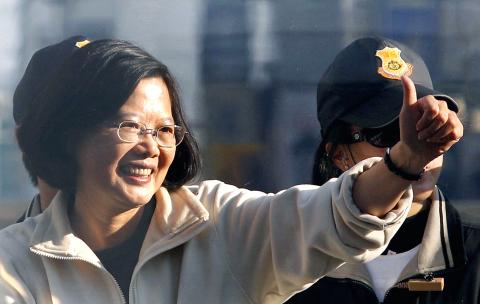Former president Lee Teng-hui (李登輝), the nation’s first directly elected president, is expected to publish an endorsement of the Democratic Progressive Party (DPP) ticket in seven Chinese--language newspapers today, one of Lee’s close aides said yesterday.
The ad, to be titled “Give Taiwan a Chance,” will express Lee’s hopes for the country from his perspective as the nation’s former leader, said the aide, who asked not to be named.
Lee is of the opinion that Taiwan needs a head of state who is competent, strong, responsible, approachable and harbors compassion for the people, and that these traits are especially obvious in Taiwanese women, the aide said.

Photo: Pichi Chuang, Reuters
However, it is still not clear if Lee, who had a cancerous tumor removed in early November, will personally attend a campaign rally to endorse DPP presidential candidate Tsai Ing-wen (蔡英文) before the elections on Saturday.
The aide said Lee, who turns 89 on Sunday, remains weak and he still is at risk of infection after the surgery. Even if he does appear at a rally, he will only be present for three to five minutes, the aide said.
In an advertisement yesterday, Nobel laureate Lee Yuan-tseh (李遠哲) and 86 scientists defended Tsai’s role in the TaiMed case, calling her “capable, rational and trustworthy.”
The ad referred to Tsai’s role in the establishment of TaiMed Biologics Co (中裕新藥股份有限公司), formerly known as Yu Chang Biologics Co (宇昌生技股份有限公司), in 2007.
In March of that year, Tsai approved government investment in the new biotech venture in her capacity as vice premier. She then stepped down from her post in May and became chairwoman of the company in September.
The Chinese Nationalist Party (KMT), led by President Ma Ying-jeou (馬英九), has accused Tsai of a conflict of interest.
Academia Sinica president Wong Chi-huey (翁啟惠) denied the charges at the time, saying Tsai was invited by the company’s executive team to be its chairwoman.
In a newspaper ad titled “Scientists’ conscience,” the scientists yesterday said: “The TaiMed case is a successful example of a biotech venture, but has fallen victim to a smear campaign.”
The ad was co-signed by Lee and 86 other scientists, including Patrick Yang (楊育民), executive vice president of Switzerland-based Roche, 23 Academia Sinica researchers and Hsu Chao-hui (許照惠), founder and vice chairman of US-based IVAX Corp.
The scientists also praised Tsai’s contribution to the venture, saying she had done her best for the country’s biotech development, and appealed to people to give Tsai justice.
Wong was not among the signatories to the ad.
When asked by the press for comment, DPP spokesperson Chen Chi-mai (陳其邁) said it was understandable that Wong did not sign the statement, given his official status as head of the academy.
Additional reporting by Lee Hsin-fang and Liu Jung

ENDEAVOR MANTA: The ship is programmed to automatically return to its designated home port and would self-destruct if seized by another party The Endeavor Manta, Taiwan’s first military-specification uncrewed surface vehicle (USV) tailor-made to operate in the Taiwan Strait in a bid to bolster the nation’s asymmetric combat capabilities made its first appearance at Kaohsiung’s Singda Harbor yesterday. Taking inspiration from Ukraine’s navy, which is using USVs to force Russia’s Black Sea fleet to take shelter within its own ports, CSBC Taiwan (台灣國際造船) established a research and development unit on USVs last year, CSBC chairman Huang Cheng-hung (黃正弘) said. With the exception of the satellite guidance system and the outboard motors — which were purchased from foreign companies that were not affiliated with Chinese-funded

PERMIT REVOKED: The influencer at a news conference said the National Immigration Agency was infringing on human rights and persecuting Chinese spouses Chinese influencer “Yaya in Taiwan” (亞亞在台灣) yesterday evening voluntarily left Taiwan, despite saying yesterday morning that she had “no intention” of leaving after her residence permit was revoked over her comments on Taiwan being “unified” with China by military force. The Ministry of the Interior yesterday had said that it could forcibly deport the influencer at midnight, but was considering taking a more flexible approach and beginning procedures this morning. The influencer, whose given name is Liu Zhenya (劉振亞), departed on a 8:45pm flight from Taipei International Airport (Songshan airport) to Fuzhou, China. Liu held a news conference at the airport at 7pm,

Taiwan was ranked the fourth-safest country in the world with a score of 82.9, trailing only Andorra, the United Arab Emirates and Qatar in Numbeo’s Safety Index by Country report. Taiwan’s score improved by 0.1 points compared with last year’s mid-year report, which had Taiwan fourth with a score of 82.8. However, both scores were lower than in last year’s first review, when Taiwan scored 83.3, and are a long way from when Taiwan was named the second-safest country in the world in 2021, scoring 84.8. Taiwan ranked higher than Singapore in ninth with a score of 77.4 and Japan in 10th with

GRIDLOCK: The National Fire Agency’s Special Search and Rescue team is on standby to travel to the countries to help out with the rescue effort A powerful earthquake rocked Myanmar and neighboring Thailand yesterday, killing at least three people in Bangkok and burying dozens when a high-rise building under construction collapsed. Footage shared on social media from Myanmar’s second-largest city showed widespread destruction, raising fears that many were trapped under the rubble or killed. The magnitude 7.7 earthquake, with an epicenter near Mandalay in Myanmar, struck at midday and was followed by a strong magnitude 6.4 aftershock. The extent of death, injury and destruction — especially in Myanmar, which is embroiled in a civil war and where information is tightly controlled at the best of times —